Natural killer cell function and activity testing
for cell therapy development
Hyoun Chan Cho, M.D., Ph.D.
Department of Laboratory Medicine
Natural killer cells (NK cells) are a type of lymphocyte that are important for the innate immune system. These lymphocytes cause cell lysis without requiring an immunization process, and their primary role is to spontaneously kill tumor cells or virus-infected cells, thereby eliminating abnormal cells infected from within rather than external invaders. There are approximately 100 million NK cells in the body, comprising 5%–10% of all lymphocytes. Unlike T cells, they mature in the liver or bone marrow.
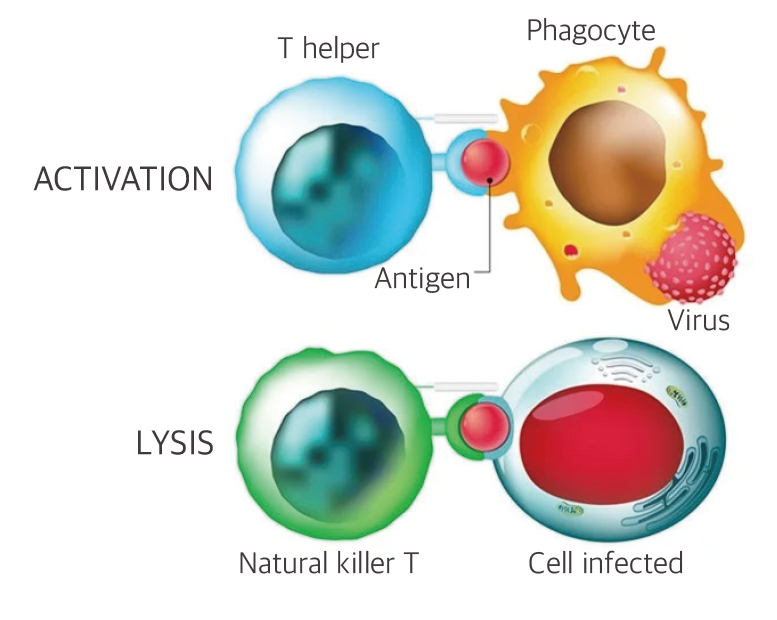
Ref) https://www.news-medical.net/health
Fig. 1. Role of natural killer cells in the innate immune system
All cells in the body possess a type of identification card or identification band called major histocompatibility complex class I (MHC-I), which comprises various protein fragments within each cell. If viruses or bacteria invade a cell, they attach to the MHC and become visible on the cell surface. Cells displaying these antigens are eliminated by helper T cells. However, to avoid labeling this antigen, NK cells detect the removal of MHC-I from the cell surface and target cells with decreased MHC-I levels.
Natural killer cell function: Attack virus-infected cells or tumor cells
Characteristics that can effectively control tumor stem cells
Infected cells cannot function properly because their DNA has been tampered with or altered, leading them to become hosts for pathogens, synthesizing DNA and RNA proteins to create pathogens. If these cells are left alone, they will produce endless germs. Therefore, NK cells patrol to find infected cells and induce apoptosis or release cytotoxic granules containing perforin and granzymes to disrupt cellular homeostasis and cause cell necrosis.
One key distinction between apoptosis and cell lysis, in which viruses (virions) are released through cell destruction, is that even the viruses inside the cells are killed.
The role of NK cells is to suppress the increase in specific antigens by destroying abnormal cells. Sometimes, instead of directly attacking cells, NK cells recruit other immune cells for assistance. NK cells lack receptors related to T/B cells, meaning they cannot recognize these cells, which are responsible for innate immunity.
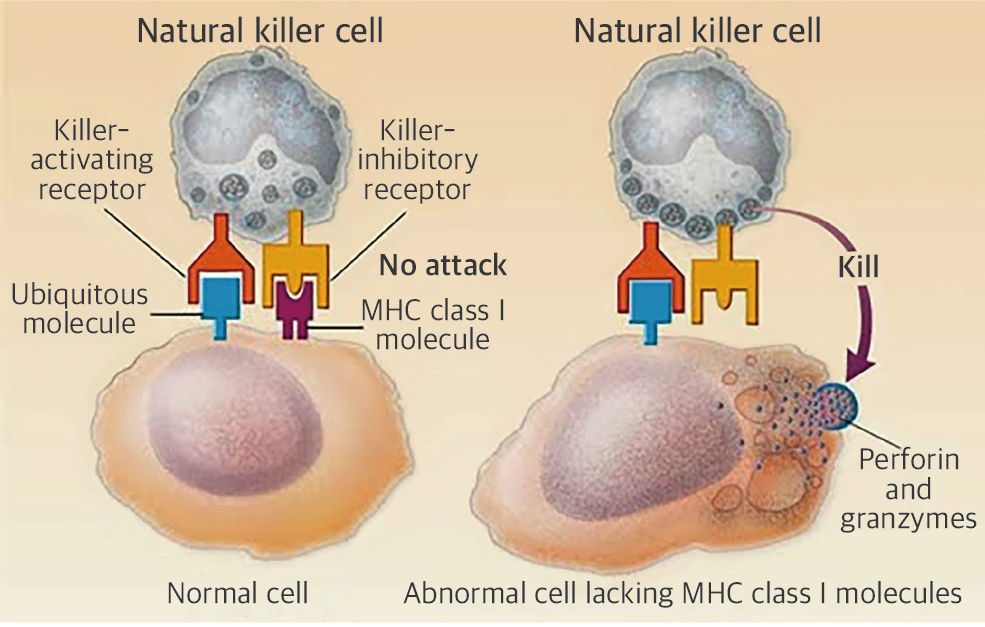
Ref) https://www.biotechfront.com/
Fig. 2. NK cells defense against intercellular pathogens
The way NK cells attack virus-infected cells or tumor cells is by recognizing these abnormal cells and then releasing a specific protein called perforin to dissolve the cell membrane and create a hole. Additionally, proteases and related molecules called granzymes enter through pores in the cell membrane and induce apoptosis or disrupt cellular homeostasis. Moreover, NK cells may secrete substances such as chemokines and cytokines that induce an immune response by stimulating the proliferation of other immune cells.
Furthermore, NK cells not only attack cancer cells to prevent cancer development, proliferation, and metastasis, but they can also effectively control tumor stem cells (tumor-initiating cells) in the pre-cancer cell differentiation stage. Tumor stem cells possess excellent self-proliferative abilities, strong regenerative and differentiation abilities, and play an important role in tumor formation, cancer metastasis, and recurrence. These cells derived from the same tissue are of various types and exhibit high resistance to anticancer drugs.
This study reveals that NKG2D and 2B4 are important activation receptors for the anticancer activity of NK cells. Efforts are also underway to treat leukemia and multiple myeloma by transplanting allogeneic hematopoietic stem cells with the same MHC-I genotype, and research is ongoing to induce anticancer activity by injecting cytokines that activate NK cells. However, many unknown facts about the function of NK cells persist, prompting ongoing research.

Ref) Nature Immunology. 2008;9:503–510
Fig. 3. Biological roles of NK cells are indicated in red and blue.
Development of treatment for cancer patients by revitalizing immune cell function in terminal and metastatic cancer
NK cell function recovery method for killing cancer cells confirmed in animal testing
A domestic research team has discovered that NK cells that have lost their function can be restored by a specific protein (IL-21) and can kill cancer cells. NK cells are cells that spontaneously kill tumor or virus-infected cells. IL-21 is a protein that stimulates the immune system to fight bacteria or viruses that enter the body.
Cancer cells are eliminated by T cells, which are part of the body’s immune system. However, in patients with terminal cancer, MHC-I on the surface of cancer cells is lost, making T cells unable to eliminate cancer cells. Typically, these cancer cells are removed by NK cells, but NK cells also lose their function, making it difficult to treat patients.
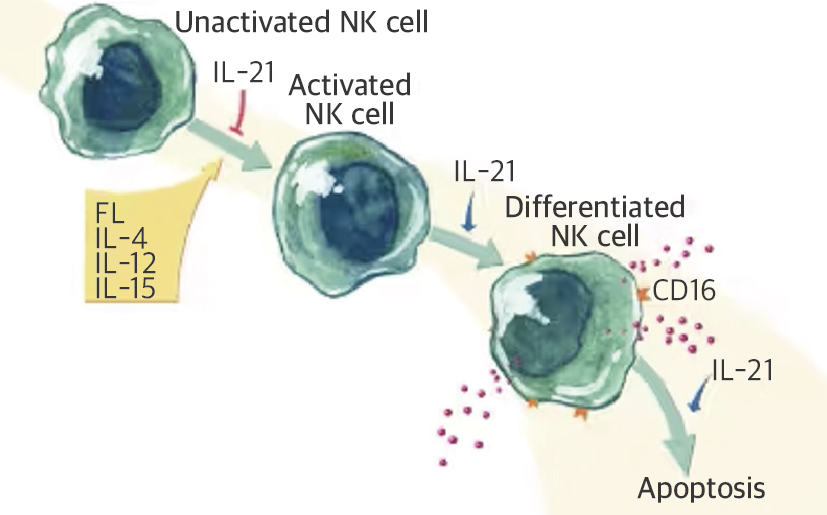
Ref) IL-21: A New Regulator of NK Cell Activity. https://www.rndsystems.com/
Fig. 4. IL-21 acts to prevent activation of NK cells, promote CD16 expression and IFN-gamma secretion of activated NK cells, and initiate apoptosis in differentiated NK cells.
This research team revealed that NK cells initially eliminate cancer cells that have lost MHC-I, but in the long term, they induce loss of NK cell function, leading to cancer metastasis. In this process, we learned that cancer cells exhibit an immune evasion phenomenon that allows them to avoid the immune system. Additionally, it was revealed that the cytokine IL-21 can eliminate cancer cells by restoring NK cells that have lost their function. The results of this study were published in Nature Communications in 2017.
Natural killer cell activity test—the NK Vue kit
Health insurance selective benefits applied to stomach cancer patients
As the number of NK cells increases, the power to eliminate viruses and cancer cells, or enhance immunity, increases. However, immunity depends not only on the quantity of NK cells but also on their ability to target abnormal cells. Even with a high number of NK cells, if their activity is low, immunity cannot be considered robust, making it difficult to eradicate cancer cells.
When NK cells are activated, they secrete interferon(IFN)-gamma, which is a type of protein with the activity level indicated by the amount of IFN secreted in the blood. Average levels by age are 777.77 pg/mL for those in their 20s, 817.90 pg/mL in their 30s, 700.77 pg/mL for those in their 40s, 649.72 pg/mL for those in their 50s, and 642.32 pg/mL for those in their 60s or older. A level of 300 pg/mL is considered a “state of reduced immunity” wherein cancer cells and viruses may not be properly eliminated.

Ref) https://www.nkmax.com/
Fig. 5. NK Vue® kit test: Principle and method
The NK Vue® kit, developed by the domestic biocompany NKMAX Co., Ltd., can be employed to measure the activity of NK cells, a type of lymphocyte that destroys cancer cells, using just 1 mL of blood. The company behind this product asserts that it serves as a valuable tool for cancer prevention by assessing the attack potency of NK cells, which are immune cells responsible for combating various cancers and viruses within the body.
Individuals who may benefit from this test include those predisposed to various adult diseases and infectious diseases, patients with cancers, smokers, excessive drinkers, and individuals exposed to high levels of stress. Furthermore, it has been suggested that by assessing NK cell activity through a small amount of blood sample, one can ascertain levels closely related to the development of stomach cancer, colon cancer, breast cancer, prostate cancer, and pancreatic cancer, by integrating various research findings.
The NK cell activity test received approval as a medical device from the Ministry of Korea Food and Drug Safetyin 2012 and was recognized as a novel medical technology by the Ministry of Korea Health and Welfare in 2014. It successfully underwent evaluation as a new medical technology, recognizing its efficacy in monitoring the condition and treatment progress of cancer patients. However, it has not been recognized as an effective technology for predicting cancer development. In July 2016, it was included as a selected health insurance benefic by the Korea Health Insurance Review and Assessment service, with applicability extended to stomach cancer patients. In 2019, ATGen Co., Ltd. merged with NKMAX and subsequently rebranded as "NKMAX."
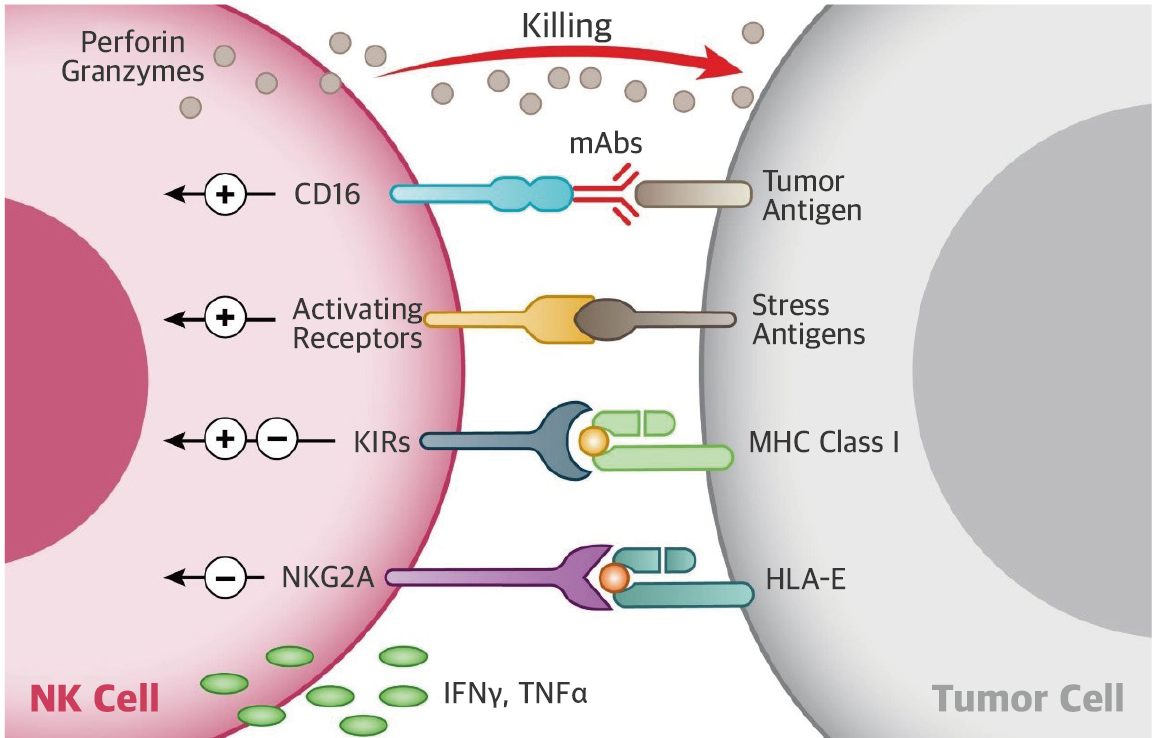
Ref) Technology of Artiva Biotherapeutics.
Fig. 6. Target of NK cell therapy
Anticancer Natural killer cell treatment
Manufacturing platform for GC Cell’s cell therapy
Cellular immunotherapy involves techniques that adapt and enhance the natural killing ability of NK cells of the innate immune system. NK cells are the body’s first line of defense against tumors and other pathogenic cells, using a complex system of receptors to distinguish self from nonself and detect stress antigens on the surface of target cells. Unlike T cells, NK cells are not activated through the MHC pathway and thus are at a reduced risk of alloreactivity and graft-versus-host disease. When activated, NK cells release perforin and granzymes to kill target cells and secrete cytokines to recruit and engage other immune cells. NK cells also serve as mechanistic mediators of antibody-dependent cytotoxicity. Monoclonal antibodies or NK participant protein treatments interact with and activate CD16 on the surface of NK cells, leading to the killing of target cells.
The cell expansion and activation technology developed and refined by GC Cell over more than 10 years is exclusively used by its U.S. partner, Artiva Biotherapeutics, which operates a cell therapy manufacturing platform. This platform uses allogeneic NK cells extracted from umbilical cord blood. Depending on GC Cell’s manufacturing method, hundreds or thousands of patients can be treated with the potential for repeated administrations in an outpatient setting. We have created a highly scalable process capable of producing sufficient, pure, and consistently active NK cells from individual cord blood samples for treatment. These NK cells are cryopreserved and can be used as a finished product for treatment without the need for complex manipulation in clinical practice.
In 2017, GC Cell acquired a patent for an efficient manufacturing method of highly stable NK cells. This patent represents GC Cell’s unique technology, using platelet lysate to maintain a stable proliferation rate and cytotoxicity of NK cells. Due to their difficulty in culture and short activation period, the key to commercialization was securing technology to extend the duration of activity and mass-produce them after isolation and culture. MG4101, an anticancer NK cell treatment developed by GC Cell, is a cell treatment product cultivated by isolating NK cells, which have the function of destroying cancer or abnormal cells, from the blood of healthy individuals.
References
01. Eric Vivier, Elena Tomasello, Myriam Baratin, Thierry Walzer & Sophie Ugolini. Functions of natural killer cells. Nature Immunology 2008;9:503–510
02. Sourav Paul, imageGirdhari Lal. The Molecular Mechanism of Natural Killer Cells Function and Its Importance in Cancer Immunotherapy (Review Article). Front Immunol, 2017;8. https://doi.org/10.3389/fimmu.2017.01124
03. Lee S-B, Cha J, Kim I-K, Yoon JC, Lee HJ, Park SW, et al. A high-throughput assay of NK cell activity in whole blood and its clinical application. BiochemBiophysRes Commun. 2014 Mar 14;445(3):584–90.
04. Park S, MunYC, SeongC-M, Huh HJ, Huh J. Variable Natural Killer Cell Activity in Hematological Malignancies at Diagnosis. Laboratory Medicine Online. 2018;8(2):41.
05. NK Vue® test For Natural Killer Cell Activity Determination Characteristics & Recommendations for Use. 2021
Test Information
Test item | Specimen (mL) | Test schedule/ Analytical time (day) | Test method |
(GC Labs code: S510) | EDTA WB 3.0 | Mon-Sat / 1 | Flow cytometry |
(GC Labs code: S528) | |||
(GC Labs code: S529) | |||
(GC Labs code: S771) | |||
(GC Labs code: S511) | |||
(GC Labs code: L461) | Plasma 0.5 (exclusive container*) | Mon-Fri / 1 | ELISA |
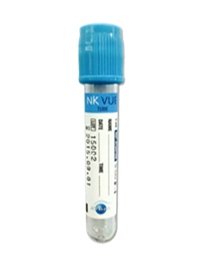
Stability/Volume
Before collection: Refrigeration / After collection: Ambient / Blood 1.0 mL
Handling
· Reusing a container that has been left at ambient temperature for more than one hour is prohibited.
· Use of rollers and excessive mixing are prohibited after blood collection.
· Store it in an incubator within 30 minutes after specimen collection (After blood collection, refrigerated or frozen storage is prohibited until incubation.)
· Collect the supernatant after 20~24 hours of incubation
* The above information is as of March 1, 2024 and subject to change. Please see the latest information here (http://www.gclabs.co.kr/eng).

